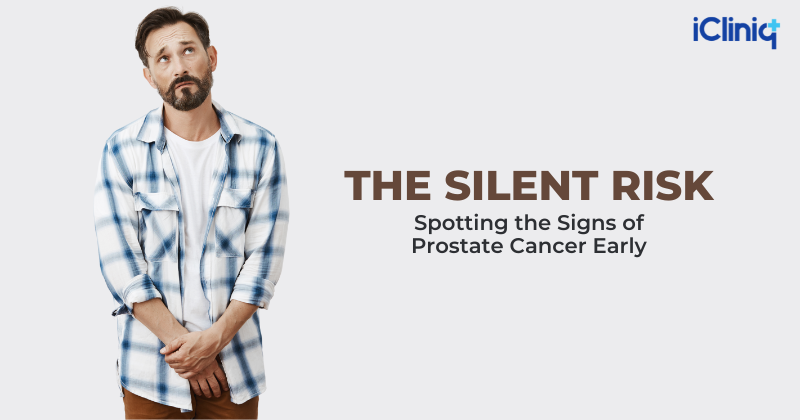Click here to chat with me!
Search our website now
Latest Posts
Prostate cancer is one of the most common cancers in men, and it usually develops slowly. According to statistics, prostate cancer ranks as the fourth most common cancer globally. In the United States, prostate cancer is the second most common cancer in men. It primarily affects older adults, with about 1 in 8 men receiving a diagnosis at some point in their lives. The good news? Most men diagnosed with prostate cancer don’t die from it, thanks to early detection and advances in treatment. The challenge? In its early stages, it often shows no symptoms at all. That’s why it’s known as the silent risk. But catching it early gives you the best chance at effective treatment and survival. So, how do you know when to get checked? Let’s break it down. Why Prostate Cancer Often Goes Unnoticed? The prostate is a small gland located below the bladder, and it plays a vital role in male reproductive health. When abnormal cells start growing in this gland, it’s often so subtle that most men won’t notice any immediate changes. This is what makes prostate cancer so dangerous—it can quietly progress without any clear warning signs. Unlike some diseases that scream for attention, prostate cancer whispers. And if you’re not paying close attention, you might miss the whisper altogether. Early Signs You Shouldn’t Ignore While early prostate cancer is usually symptomless, some early signs may show up in subtle ways: Frequent urination, especially at night. Difficulty starting or stopping urination. Weak or interrupted urine flow. Pain or burning sensation during urination. Blood in urine or semen. Painful ejaculation. Discomfort in the pelvic area or lower back. These symptoms can also be caused by other non-cancerous conditions, like an enlarged prostate (BPH) or infections—but that doesn’t mean you should ignore them. What Increases Your Risk? Certain factors can raise your chances of developing prostate cancer: Age: Risk increases in males above 50. Family History: Especially if a father or brother had it. Diet and Lifestyle: High-fat diets and obesity may contribute to the risk. If any of these apply to you, regular screening becomes even more important. When and Why to Get Screened? Screening for prostate cancer typically includes a Prostate-Specific Antigen (PSA) blood test and sometimes a Digital Rectal Exam (DRE). These can help detect early abnormalities even before symptoms appear. Doctors generally recommend discussing screening options around age 50—or earlier if you're at higher risk. The earlier prostate cancer is caught, the more treatment options are available—and the better the outcome. Treatment Depends on Early Detection If caught early, prostate cancer is highly treatable. Treatment options range from active surveillance to surgery, radiation, or hormone therapy, depending on how aggressive the cancer is. Listen to Your Body Don’t let silence fool you. Just because you feel fine doesn’t mean your health is fine. Whether it’s a slight change in your bathroom habits or a sense that something just isn’t right, it’s worth getting checked. Prostate cancer may be silent—but your actions don’t have to be.
Ahead of Intelligent Health (13-14 September 2023, Basel, Switzerland), we asked Yurii Kryvoborodov, Head of AI & Data Consulting, Unicsoft, his thoughts on the future of AI in healthcare. Do you think the increased usage of Generative AI and LLMs will have a dramatic impact on the healthcare industry and, if so, how? Generative AI is just a part of the disruptive impact of all AI tech on the healthcare industry. It allows to dramatically reduce time efforts, costs and chances of mistakes. Generative AI and LLMs are applied to automating clinical documentation, drug discovery, tailoring of treatment plans to individual patients, real-time clinical decision support and health monitoring, extracting valuable insights from unstructured clinical records, streamlining administrative tasks like billing and claims processing, providing instant access to comprehensive medical knowledge. And this list continues.
We sat with Benjamin von Deschwanden, Co-Founder and CPO at Acodis AG, to ask him his thoughts on the future of AI in healthcare. Do you think the increased usage of Generative AI and LLMs will have a dramatic impact on the healthcare industry and, if so, how? I think that the strength of Generative AI lies in making huge amounts of information accessible without needing to manually sift through the source material. Being able to quickly answer any questions is going to be transformative for everyone working with increasingly bigger data sets.The challenge will be to ensure that the information we get by means of Generative AI is correct and complete – especially in healthcare – as the consequences of wrong data can be fatal. We at Acodis are actively working on practical applications of Generative AI inside our Intelligent Document Processing (IDP) Platform for Life Science and Pharma clients to drive efficiency and accelerate time to market, whilst controlling the risks.
Intelligent Health 2024 returns to Basel, Switzerland on 11th–12th September. We’ve got prominent speakers. An extensive programme. Groundbreaking advancements in #HealthTech. And much, much more. Our incredible 2024 programme will dive deeper than ever before. From sharing the latest innovation insights to exploring use cases of AI application in clinical settings from around the world. All through our industry-renowned talks, limitless networking opportunities, and much-loved, hands-on workshops. Read on to discover what themes await at the world’s largest AI and healthcare summit.
We sat down with Margrietha H. (Greet) Vink, Erasmus MC’s Director of Research Development Office and Smart Health Tech Center, to ask her for her thoughts on the future of AI in healthcare. Do you think the increased usage of Generative AI and LLMs will have a dramatic impact on the healthcare industry and, if so, how? The integration of Generative AI and LLMs into the healthcare industry holds the potential to revolutionise various aspects of patient care, from diagnostics and treatment to administrative tasks and drug development. However, this transformation will require careful consideration of ethical, legal, and practical challenges to ensure that the benefits are realised in a responsible and equitable manner.











